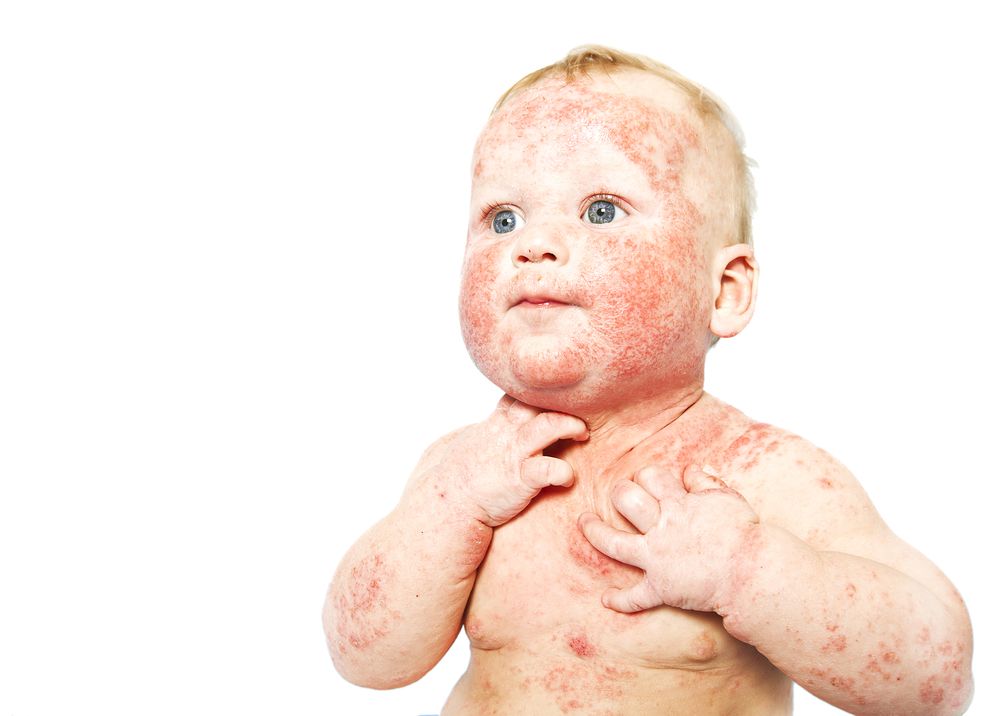- Acne
- Actinic Keratosis
- Aesthetics
- Alopecia
- Atopic Dermatitis
- Buy-and-Bill
- COVID-19
- Case-Based Roundtable
- Chronic Hand Eczema
- Chronic Spontaneous Urticaria
- Drug Watch
- Eczema
- General Dermatology
- Hidradenitis Suppurativa
- Melasma
- NP and PA
- Pediatric Dermatology
- Pigmentary Disorders
- Practice Management
- Precision Medicine and Biologics
- Prurigo Nodularis
- Psoriasis
- Psoriatic Arthritis
- Rare Disease
- Rosacea
- Skin Cancer
- Vitiligo
- Wound Care
Article
Atopic dermatitis and the atopic march
Author(s):
Children with atopic dermatitis - especially moderate-to-severe disease - seem to have an risk of developing other atopic diseases, such as asthma, allergic rhinitis and food allergies, says this expert.
About half of patients with moderate-to-severe atopic dermatitis will develop asthma and about three-quarters will develop allergic rhinitis, according to Dr. Spergel. (©Skylines/Shutterstock.com)

Dr. Spergel

It’s pretty clear that children with atopic dermatitis - especially moderate-to-severe disease - are at risk for what researchers call the atopic march, according to Jonathan Spergel, M.D., chief of the Allergy Program at Children’s Hospital of Philadelphia and a speaker for the National Eczema Association.
NEW: Eczema more common in black patients
“Whether we call it a march of progression or association is a nuance, but it’s a fact that many children with atopic dermatitis early in life, as they get older will develop other atopic diseases, such as asthma, allergic rhinitis and food allergies,” Dr. Spergel says. “It’s not that everyone goes on to develop asthma or allergic rhinitis, but there’s definitely an increased risk. And the risk goes up by the severity of the atopic dermatitis.”
About half of patients with moderate-to-severe atopic dermatitis will develop asthma and about three-quarters will develop allergic rhinitis, according to Dr. Spergel.
The classic atopic march starts with atopic dermatitis and is followed by the potential for food allergy, then asthma, then allergic rhinitis. But the succession, if it happens at all, can vary, he says.
WHY THE MARCH HAPPENS
The evidence in human and animal studies suggests inflamed skin leads to increased sensitization, according to Dr. Spergel.
“When you have inflamed eczema, you’re more likely to develop asthma or allergic rhinitis to whatever allergen you’re exposed to,” he says.
RELATED: Atopic dermatitis patients’ access to care varies across US
DERAILING THE MARCH
Dermatologists might be able to prevent other atopic diseases if they’re able to treat eczema appropriately and aggressively, according to Dr. Spergel.
“That’s true in almost any disease. Inflammation in active disease is never a good thing, so we need to control the disease by treating patients with appropriate medication-whether that’s topical or even systemic medication. That can make a difference,” he says.
Whether one medication makes more of a difference in derailing the march than others is unknown. And it’s too early to tell if newer systemic agents, like dupilumab, might help prevent onset of other atopic diseases, Dr. Spergel says.
Dermatologists should consider referring atopic dermatitis patients who develop other atopic conditions if they’re uncomfortable treating those conditions, as well as to identify potential allergens that are triggering the atopic diseases, according to Dr. Spergel.
RECENT PEER-REVIEWED RESEARCH
Early-life atopic dermatitis is a major risk factor for developing any atopic disease. But, in reality, only about 3% of children in the general population seem to follow the complete atopic march course, progressing from atopic dermatitis to food allergy, asthma and rhinoconjunctivitis, according the paper “Report from the National Institute of Allergy and Infectious Diseases workshop on ‘Atopic dermatitis and the atopic march: Mechanisms and interventions,’” published March 2019 in the Journal of Allergy and Clinical Immunology.
The authors confirm that children with severe atopic dermatitis are more likely to progress to other allergic diseases than children with less severe disease.
RELATED: Atopic dermatitis linked to increased risk of atrial fibrillation
“Early-onset persistent [atopic dermatitis], multisensitization to allergens, and familial atopy are risk factors for the classical atopic march or development of multiple comorbidities,” the researchers write. “Progression from [atopic dermatitis] to [food allergy], particularly peanut allergy, is significantly associated with multisensitization and development of allergic airway disease.”
The researchers also confirm the strong association between atopic dermatitis and allergic sensitization, with skin barrier defects in atopic dermatitis patients increasing the risk of epicutaneous sensitization to food allergens and aeroallergens.
Filaggrin mutations increase potential for sensitization through the skin, implying skin barrier dysfunction might predispose patients to the atopic march, they write.
But little is known about how to prevent the march.
“Early prevention and treatment of [atopic dermatitis] should be tested as a strategy to inhibit the development of food allergies and atopic airway disease,” they write.
CONTROVERSY REMAINS
In the paper “Atopic Dermatitis Is a Barrier Issue, Not an Allergy Issue,” published November 2019 in Immunology and Allergy Clinics of North America, the authors point to weaknesses in the thinking that skin barrier dysfunction from atopic dermatitis likely leads to development of other allergic diseases later in life.
RELATED: Itch may require different treatment approaches
The authors argue that while children with atopic dermatitis are more likely to produce specific immunoglobulin E to food and environmental allergens, the evidence is conflicting about whether allergen avoidance notably improves disease severity in these patients. And food-elimination diets in atopic dermatitis patients could increase their risks of developing immediate, life-threatening reactions to the removed foods.
“Given these findings, it is important to educate and counsel parents of children with [atopic dermatitis] about the disease pathogenesis, proven treatment strategies, and the limited benefit and even potential harm associated with strict allergen avoidance,” they write.
References:
1. Davidson WF, Leung DYM, Beck LA, et al. Report from the National Institute of Allergy and Infectious Diseases workshop on "Atopic dermatitis and the atopic march: Mechanisms and interventions". J Allergy Clin Immunol. 2019;143(3):894-913.
2. Kraft MT, Prince BT. Atopic Dermatitis Is a Barrier Issue, Not an Allergy Issue. Immunol Allergy Clin North Am. 2019;39(4):507-519.
Newsletter
Like what you’re reading? Subscribe to Dermatology Times for weekly updates on therapies, innovations, and real-world practice tips.











